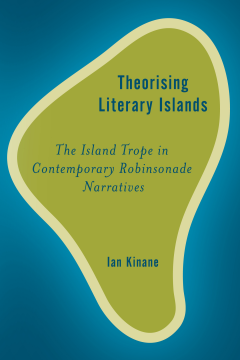
Additional Information
Book Details
Abstract
Theorising Literary Islands is a literary and cultural study of both how and why the trope of the island functions within contemporary popular Robinsonade narratives. It traces the development of Western “islomania” – or our obsession with islands – from its origins in Daniel Defoe’s Robinson Crusoe right up to contemporary Robinsonade texts, focusing predominantly on American and European representations of fictionalized Pacific Island topographies in contemporary literature, film, television, and other media. Theorising Literary Islands argues that the ubiquity of island landscapes within the popular imagination belies certain ideological and cultural anxieties, and posits that the emergence of a Western popular culture tradition can largely be traced through the development of the Robinsonade genre, and through early European and American fascination with the Pacific region.
Ian Kinane is Lecturer in English Literature at the University of Roehampton, where he teaches popular genre fiction, postcolonial literatures, and children's literature. He is the editor of Didactics and the Modern Robinsonade: New Paradigms for Young Readers (Liverpool University Press 2018) and Landscapes of Liminality: Between Space and Place (Rowman & Littlefield, 2016). Ian is currently writing a monograph on British-Jamaica cultural relations in Ian Fleming's Jamaica-set James Bond novels, and he is the editor of the peer-review, open-access International Journal of James Bond Studies.
In Theorising Literary Islands Ian Kinane deals with the notion that Robinson Crusoe persuaded readers that ‘islands were not confining but liberating; not lonely but contemplative’. Certainly the ‘Robinsonade’ genre to which Defoe’s Crusoe gave rise in literature and later other media has had major impacts on the perception of islands in guises from narratives of imperialism to contemporary tourism to any one of a huge number of insular destinations marketed ¬– or perhaps given an often challenging reality, rather hyped – as ‘paradise islands’. Focusing on the Pacific, Hau’ofa’s ‘sea of islands’, Kinane considers the ‘imaginative representation of island landscapes’ and its meaning at spatial and cultural scales ranging from the ‘topography of self’ – ‘I-land’ – to the seemingly endless mass appeal of the television series Survivor. Theorising Literary Islands will be of value to scholars of literature and also has wider appeal to those interested in the burgeoning field of Island Studies.
Stephen A. Royle, Emeritus Professor of Island Geography, Queen’s University Belfast
Theorising Literary Islands makes an important contribution to island studies by pulling disparate prior scholarship on the island motif into conversation with under-discussed castaway texts. By drawing together various threads into a cohesive discussion, Kinane makes a cogent argument for larger implications of Western literary and cinematic islands, one that will benefit island scholars worldwide.
Rebecca Weaver-Hightower, Professor of English and Postcolonial Studies, University of North Dakota, USA
The book offers a reflection on the culturally constructed trope of the island and its evolution from the colonial context of the eighteenth century to contemporary Western culture. Indeed, the desert island is a favourite topos of popular culture, as can be seen in the abundance of island narratives across diverse media. Kinane describes the trope of the island as an “overdetermined metaphor.” He explores a vast corpus of popular texts, films, and television shows in this ambitious study, including fictions by Stacpoole, Lawrence, Golding, Tournier, Sage, Garland, and Martel; films such as Mutiny on the Bounty; series including Gilligan’s Island, Fantasy Island, and Lost; and even reality shows like Survivor.
Theorising Literary Islands is a lively addition to island studies exploring the evolution of the Robinsonade from founding literary narratives such as Robinson Crusoe to twenty-first century remediations in film and television including Lost and Survivor. Kinane offers new understanding of the ongoing centrality of the geo-imaginary space of the Pacific to discourses of neo-colonialism, Western individualism, and redemption within contemporary British and American culture.
Sherae Deckard, Assistant Professor, University College Dublin
Table of Contents
| Section Title | Page | Action | Price |
|---|---|---|---|
| _GoBack | 1 | ||
| _GoBack | 29 | ||
| _GoBack | 63 | ||
| _GoBack | 104 | ||
| _GoBack | 137 | ||
| _GoBack | 178 | ||
| _GoBack | 211 | ||
| _GoBack | 240 |
